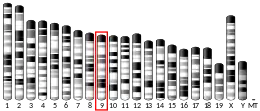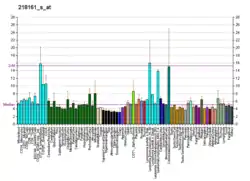CLN6
Ceroid-lipofuscinosis neuronal protein 6 is a protein that in humans is encoded by the CLN6 gene.[4][5][6]
| CLN6 | |||||||||||||||||||||||||||||||||||||||||||||||||||
|---|---|---|---|---|---|---|---|---|---|---|---|---|---|---|---|---|---|---|---|---|---|---|---|---|---|---|---|---|---|---|---|---|---|---|---|---|---|---|---|---|---|---|---|---|---|---|---|---|---|---|---|
| Identifiers | |||||||||||||||||||||||||||||||||||||||||||||||||||
| Aliases | CLN6, CLN4A, HsT18960, nclf, ceroid-lipofuscinosis, neuronal 6, late infantile, variant, transmembrane ER protein, CLN6 transmembrane ER protein, CLN6A | ||||||||||||||||||||||||||||||||||||||||||||||||||
| External IDs | OMIM: 606725 MGI: 2159324 HomoloGene: 9898 GeneCards: CLN6 | ||||||||||||||||||||||||||||||||||||||||||||||||||
| |||||||||||||||||||||||||||||||||||||||||||||||||||
| |||||||||||||||||||||||||||||||||||||||||||||||||||
| |||||||||||||||||||||||||||||||||||||||||||||||||||
| Wikidata | |||||||||||||||||||||||||||||||||||||||||||||||||||
| |||||||||||||||||||||||||||||||||||||||||||||||||||
The CLN6 protein is part of the EGRESS complex (ER-to-Golgi relaying of enzymes of the lysosomal system), which recruits lysosomal enzymes at the endoplasmic reticulum to promote their transfer to the Golgi complex.[7] The EGRESS complex is composed of CLN6 and CLN8 proteins.[7] Loss-of-function mutations in CLN6 result in inefficient export of lysosomal enzymes from the endoplasmic reticulum and diminished levels of the enzymes at the lysosome.[7]
See also
References
- GRCm38: Ensembl release 89: ENSMUSG00000032245 - Ensembl, May 2017
- "Human PubMed Reference:". National Center for Biotechnology Information, U.S. National Library of Medicine.
- "Mouse PubMed Reference:". National Center for Biotechnology Information, U.S. National Library of Medicine.
- Sharp JD, Wheeler RB, Lake BD, Savukoski M, Jarvela IE, Peltonen L, Gardiner RM, Williams RE (Jul 1997). "Loci for classical and a variant late infantile neuronal ceroid lipofuscinosis map to chromosomes 11p15 and 15q21-23". Hum Mol Genet. 6 (4): 591–5. doi:10.1093/hmg/6.4.591. PMID 9097964.
- Wheeler RB, Sharp JD, Schultz RA, Joslin JM, Williams RE, Mole SE (Jan 2002). "The gene mutated in variant late-infantile neuronal ceroid lipofuscinosis (CLN6) and in nclf mutant mice encodes a novel predicted transmembrane protein". Am J Hum Genet. 70 (2): 537–42. doi:10.1086/338708. PMC 384927. PMID 11727201.
- "Entrez Gene: CLN6 ceroid-lipofuscinosis, neuronal 6, late infantile, variant".
- Bajaj L, Sharma J, di Ronza A, Zhang P, Eblimit A, Pal R, Roman D, Collette JR, Booth C, Chang KT, Sifers RN, Jung SY, Weimer JM, Chen R, Schekman RW, Sardiello M (Jun 2020). "A CLN6-CLN8 complex recruits lysosomal enzymes at the ER for Golgi transfer". J Clin Invest. 130 (8): 4118–4132. doi:10.1172/JCI130955. PMC 7410054. PMID 32597833.
Further reading
- Dawson G, Cho S (2000). "Batten's disease: clues to neuronal protein catabolism in lysosomes". J. Neurosci. Res. 60 (2): 133–40. doi:10.1002/(SICI)1097-4547(20000415)60:2<133::AID-JNR1>3.0.CO;2-3. PMID 10740217. S2CID 28786470.
- Holopainen JM, Saarikoski J, Kinnunen PK, Järvelä I (2001). "Elevated lysosomal pH in neuronal ceroid lipofuscinoses (NCLs)". Eur. J. Biochem. 268 (22): 5851–6. doi:10.1046/j.0014-2956.2001.02530.x. PMID 11722572.
- Gao H, Boustany RM, Espinola JA, et al. (2002). "Mutations in a novel CLN6-encoded transmembrane protein cause variant neuronal ceroid lipofuscinosis in man and mouse". Am. J. Hum. Genet. 70 (2): 324–35. doi:10.1086/338190. PMC 384912. PMID 11791207.
- Strausberg RL, Feingold EA, Grouse LH, et al. (2003). "Generation and initial analysis of more than 15,000 full-length human and mouse cDNA sequences". Proc. Natl. Acad. Sci. U.S.A. 99 (26): 16899–903. Bibcode:2002PNAS...9916899M. doi:10.1073/pnas.242603899. PMC 139241. PMID 12477932.
- Teixeira CA, Espinola J, Huo L, et al. (2003). "Novel mutations in the CLN6 gene causing a variant late infantile neuronal ceroid lipofuscinosis". Hum. Mutat. 21 (5): 502–8. doi:10.1002/humu.10207. PMID 12673792. S2CID 27128687.
- Sharp JD, Wheeler RB, Parker KA, et al. (2003). "Spectrum of CLN6 mutations in variant late infantile neuronal ceroid lipofuscinosis". Hum. Mutat. 22 (1): 35–42. doi:10.1002/humu.10227. PMID 12815591. S2CID 25698616.
- Ota T, Suzuki Y, Nishikawa T, et al. (2004). "Complete sequencing and characterization of 21,243 full-length human cDNAs". Nat. Genet. 36 (1): 40–5. doi:10.1038/ng1285. PMID 14702039.
- Heine C, Koch B, Storch S, et al. (2004). "Defective endoplasmic reticulum-resident membrane protein CLN6 affects lysosomal degradation of endocytosed arylsulfatase A." J. Biol. Chem. 279 (21): 22347–52. doi:10.1074/jbc.M400643200. PMID 15010453.
- Mole SE, Michaux G, Codlin S, et al. (2004). "CLN6, which is associated with a lysosomal storage disease, is an endoplasmic reticulum protein". Exp. Cell Res. 298 (2): 399–406. doi:10.1016/j.yexcr.2004.04.042. PMID 15265688.
- Gerhard DS, Wagner L, Feingold EA, et al. (2004). "The status, quality, and expansion of the NIH full-length cDNA project: the Mammalian Gene Collection (MGC)". Genome Res. 14 (10B): 2121–7. doi:10.1101/gr.2596504. PMC 528928. PMID 15489334.
- Siintola E, Topcu M, Kohlschütter A, et al. (2005). "Two novel CLN6 mutations in variant late-infantile neuronal ceroid lipofuscinosis patients of Turkish origin". Clin. Genet. 68 (2): 167–73. doi:10.1111/j.1399-0004.2005.00471.x. PMID 15996215. S2CID 40168289.
- Otsuki T, Ota T, Nishikawa T, et al. (2007). "Signal sequence and keyword trap in silico for selection of full-length human cDNAs encoding secretion or membrane proteins from oligo-capped cDNA libraries". DNA Res. 12 (2): 117–26. doi:10.1093/dnares/12.2.117. PMID 16303743.
- Teixeira CA, Lin S, Mangas M, et al. (2006). "Gene expression profiling in vLINCL CLN6-deficient fibroblasts: Insights into pathobiology". Biochim. Biophys. Acta. 1762 (7): 637–46. doi:10.1016/j.bbadis.2006.06.002. PMID 16857350.
- Olsen JV, Blagoev B, Gnad F, et al. (2006). "Global, in vivo, and site-specific phosphorylation dynamics in signaling networks". Cell. 127 (3): 635–48. doi:10.1016/j.cell.2006.09.026. PMID 17081983.
- Heine C, Quitsch A, Storch S, et al. (2007). "Topology and endoplasmic reticulum retention signals of the lysosomal storage disease-related membrane protein CLN6". Mol. Membr. Biol. 24 (1): 74–87. doi:10.1080/09687860600967317. PMID 17453415. S2CID 35490146.
External links
- GeneReviews/NIH/NCBI/UW entry on Neuronal Ceroid-Lipofuscinoses
- Human CLN6 genome location and CLN6 gene details page in the UCSC Genome Browser.
This article is issued from Wikipedia. The text is licensed under Creative Commons - Attribution - Sharealike. Additional terms may apply for the media files.


